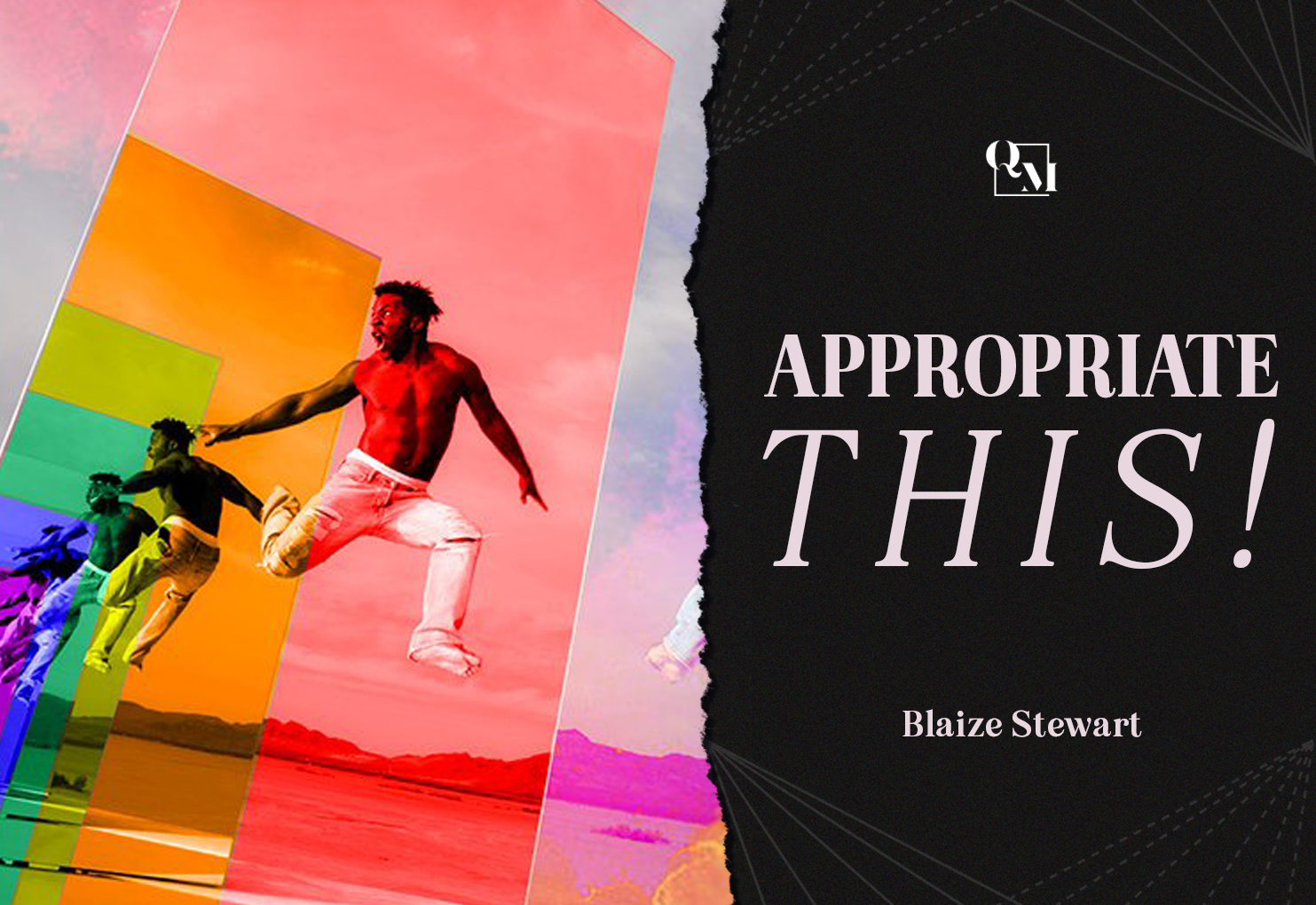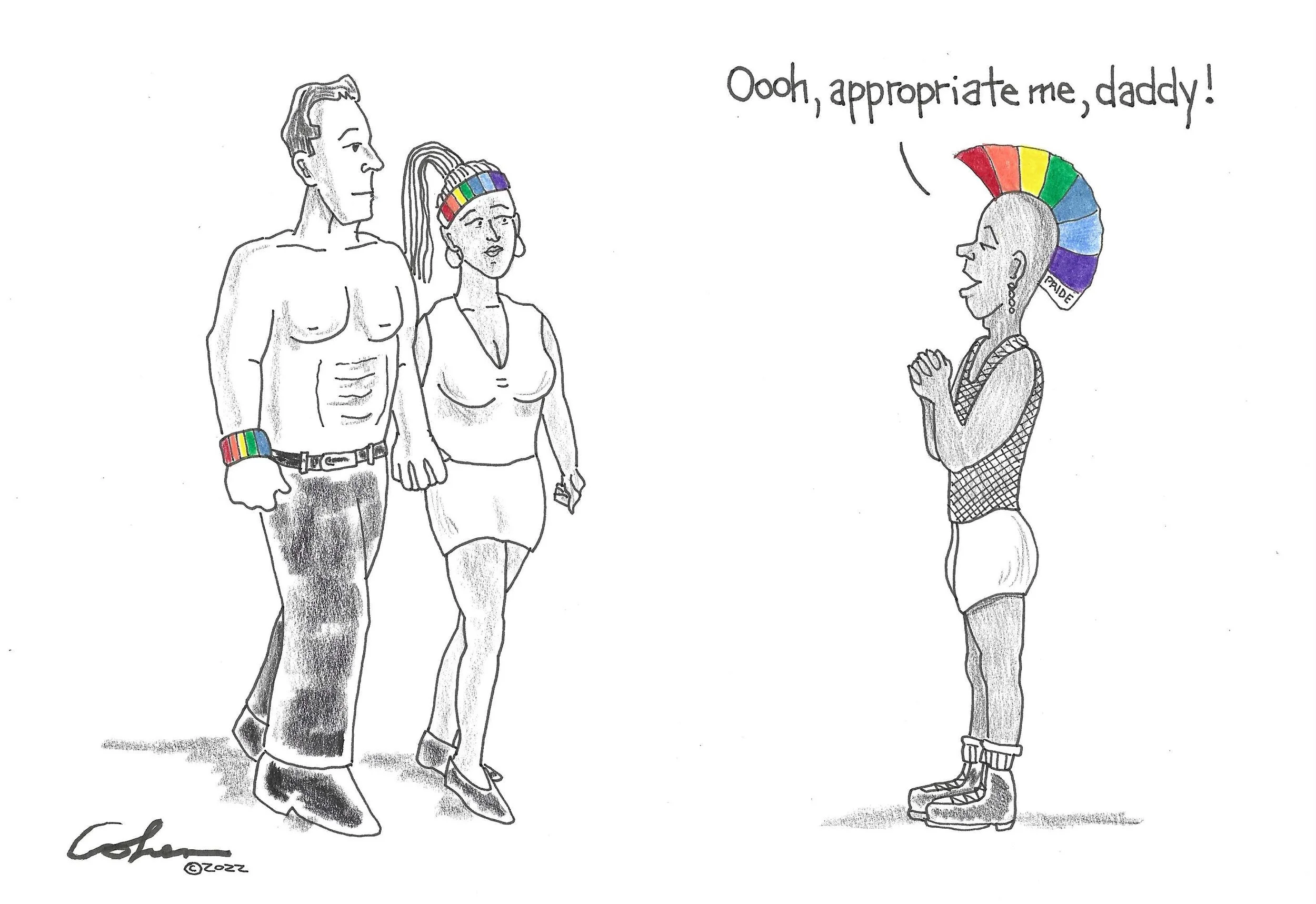Appropriate THIS!
As the acceptance and representation of LGBT culture continues to grow, the grievance-mongers among us have cried foul at what they perceive to be “appropriation”. Cultural appropriation, according to proponents of the concept, refers to the unacknowledged, uncompensated, or unfair repackaging of cultural elements from marginal communities, usually by the dominant group in society, in a way that amounts to a sort of theft. Why should LGBT folks let the same mainstream culture that held us back in the past now co-opt our culture just because they suddenly deign to find us amusing and allowable? What right do straight people have to emulate our cultural contributions now, after scorning them for so long? Haven’t we earned the right to protect what our community holds dear and unique? This is the wrong attitude. The acceptance of LGBT culture into popular culture is a sign of progress that we ought to be celebrating! We should be thrilled to integrate and even lead in society. When did we become such dour, naysaying buzzkills?
Look at how far we have come. The LGBT community has become a cultural powerhouse, launching trends, stars, shows, brands, aesthetics, and styles into the mainstream. Drag superstars like Trixie Mattel, Shangela, and Bob the Drag Queen headline shows around the world. Songs from queer artists like Lady Gaga, Lil Nas X, and Kim Petras top the music charts, saturating social media for weeks on end. LGBT storylines are highlighted in shows like Schitt’s Creek, Special, and Euphoria, and films such as Everybody’s Talking About Jamie, The Power of the Dog, and Fire Island. According to GLAAD’s annual “Where We Are on TV” report, a record high 11.9% of characters in scripted broadcast primetime programming were LGBT from 2021-2022, up 2.8 percentage points from the previous year. But not everyone in the community is cheering, for understandable reasons. They haven’t forgotten how things used to be.
When I came out as bi, it summoned a whirlwind of emotions — bitterness and rage not least among them. Not only was I sidelined from straight society, but I also found an unexpected resistance from gay circles. Both worlds told me that I was confused or in a phase — that I wasn’t gay enough for the gay community, and not straight enough for the straight community. This dual rejection cut deeper than I would like to admit. Given society's long history of intolerance, repression, and persecution of sexual minorities, and the painful scars many people still carry from their own pasts, it’s natural for people to be defensive. To some, it can feel like a slap in the face to see outsiders cherry picking components of our community to make their own. I get it.
For my own part, learning how to disengage from attack mode was a process. I used to loathe being asked, “So what’s your preference, men or women?” Being peppered with questions whose answers were obvious was irritating in the extreme. Didn’t they know bisexuality is much more complex than “What’s your preference?” Then it finally hit me: of course they didn’t. Many people are interested to learn, if only we give them the space. At my 28th birthday party, a close friend’s father, a man I have known my entire life, nervously asked me a question about being bi, prefacing it with a litany of preemptive apologies so as not to incite my wrath. It was heartbreaking to see the perception of LGBT folks as a barrier which prevents people from learning about and from one another. That moment taught me an important lesson: lighten up!
Our movement is at a crossroads: do we become mainstream, or do we try to be a country club that sees itself as separate from and superior to outsiders? Shouldn’t we be excited to attain this level of recognition? What the hell have we been fighting for all these years, if not equality? What message are we sending to the next generation by berating supporters and spurning those who appreciate our culture? These are not signs of progress or pride, but of regression and insecurity. It’s time to take “yes” for an answer. Considering what our forebears endured, I daresay we can manage to become, and I melodramatically wince to say it, accepted.
As the old adage goes, imitation is the sincerest form of flattery. Let’s welcome and encourage society as it continues to slowly absorb elements of our culture into the wider milieu. The notion that we must seek to “liberate” ourselves from all of the “oppressive systems and structures” of society is a dead end. Mainstream acceptance means the public has our backs. We did not achieve our rights and legal protections by revolutionary acts alone, but in conjunction with persuasively winning hearts and minds within the liberal democratic system. Yes, cultural diversity is important, but the world is now a globalized and interconnected place — cultures are going to mix. We cannot stop it, and it’s misguided to think that we should, because even if we somehow managed it, we’d only be hurting ourselves.
The cry of “cultural appropriation” is a call for cultural segregation and isolationism. It is the wish to stagnate into irrelevance. Cultural interchange is how new ideas and possibilities form and flourish. Virtually everything in society we enjoy today — every art form, music genre, cuisine, and school of thought — was not the product of a single culture in isolation, but of cultural fusions that span continents, traditions, ethnicities, religions, identities, and subcultures. Why avoid the opportunity for such growth and dynamism? We have the chance to build upon the hard-won foundation of generations past. And here’s the kicker: it’s happening on its own! We need only let it, and not stand in the way. Turning the page means that things won’t be the same. For some, that change can be scary. But that’s progress. That’s life. Celebrate it!



